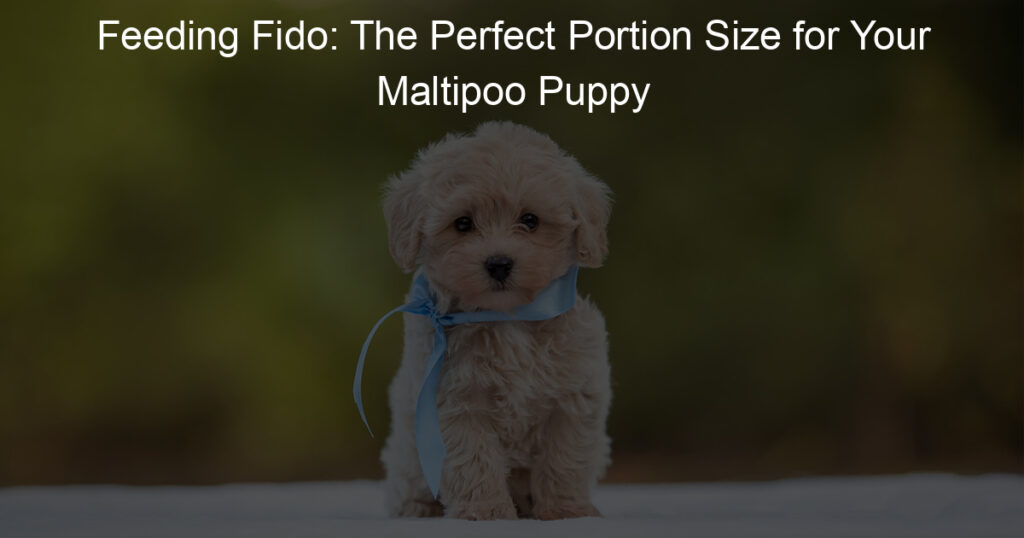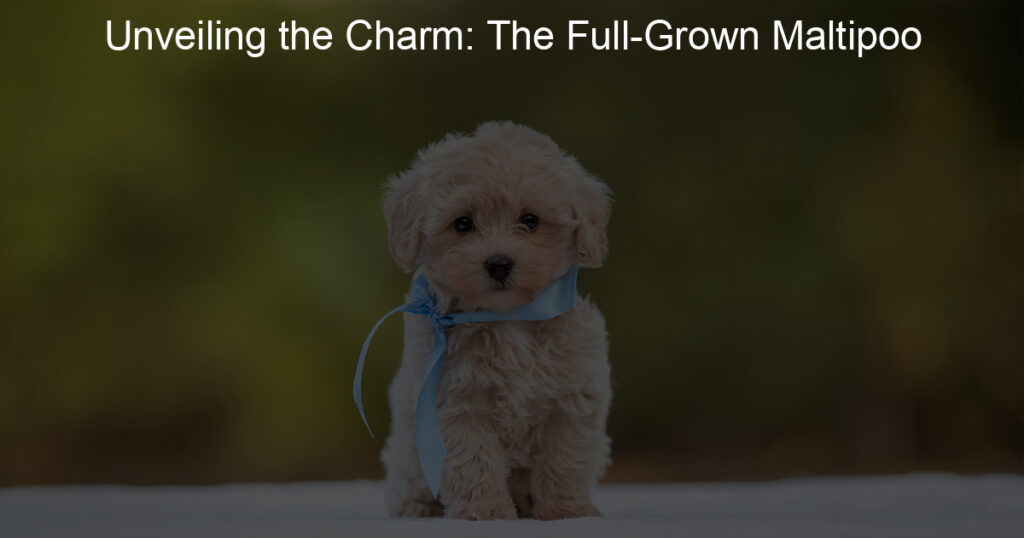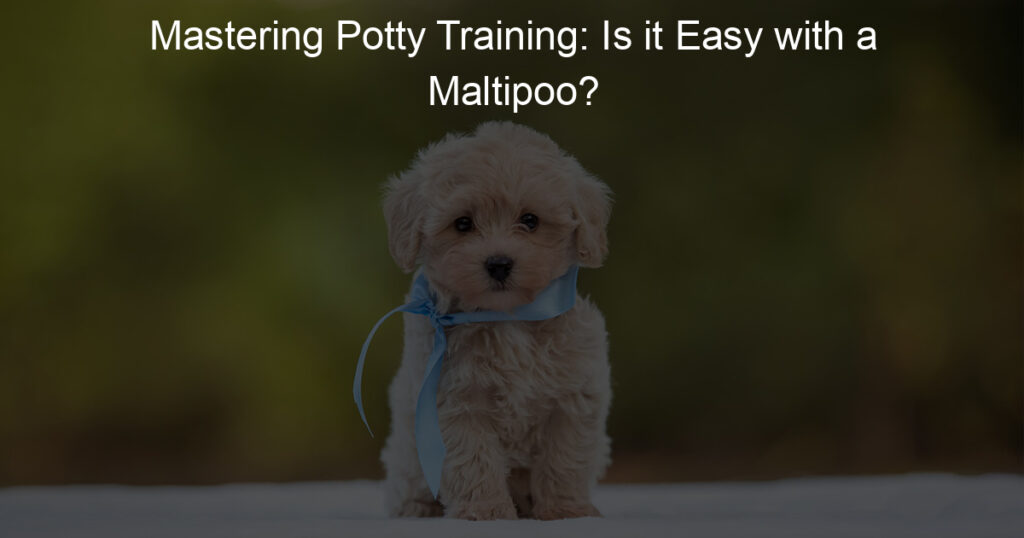
Understanding Maltipoo Weight Issues
As a Maltipoo owner, it’s essential to understand the weight issues that your furry friend may face. These issues can range from being underweight to overweight, each with its own set of challenges and health risks. Let’s delve into the details.
- Identifying overweight and underweight Maltipoos
- Common causes of weight issues in Maltipoos
- Health risks associated with overweight and underweight Maltipoos
Identifying whether your Maltipoo is overweight or underweight is the first step towards ensuring their health. An overweight Maltipoo will have a rounded appearance with no visible waistline. They may also have difficulty in walking or running and may tire easily. On the other hand, an underweight Maltipoo will have visible ribs, spine, and hip bones. They may also show signs of lethargy and lack of appetite.
There are several reasons why your Maltipoo may be facing weight issues. Overfeeding, lack of exercise, and certain medical conditions can lead to weight gain. On the other hand, underfeeding, excessive physical activity, and some health issues can cause weight loss. It’s important to consult with a vet if you notice sudden changes in your Maltipoo’s weight.
Overweight Maltipoos are at risk of developing health issues like diabetes, heart disease, and joint problems. They may also have a shorter lifespan. Underweight Maltipoos, on the other hand, may suffer from malnutrition, weakened immune system, and other health complications. Therefore, maintaining a healthy weight is crucial for your Maltipoo’s overall well-being.
Understanding your Maltipoo’s weight issues is the first step towards ensuring their health and happiness. By identifying the problem, understanding its causes, and being aware of the associated health risks, you can take the necessary steps to help your Maltipoo maintain a healthy weight.
Healthy Weight for Maltipoos
Understanding the healthy weight for your Maltipoo is crucial for their overall health and wellbeing. Let’s explore the typical weight ranges for Maltipoos based on their gender and age.
Weight Ranges for Maltipoos
The weight of a Maltipoo can vary based on factors such as gender and age. Here are the typical weight ranges:
- Weight range for male Maltipoos:
- Weight range for female Maltipoos:
- Weight range for Maltipoo puppies:
Male Maltipoos typically weigh between 5 to 20 pounds. The weight can vary based on factors like genetics, diet, and physical activity. It’s important to monitor your male Maltipoo’s weight regularly to ensure he maintains a healthy weight.
Female Maltipoos usually weigh slightly less than males, with a typical weight range of 5 to 15 pounds. Like males, their weight can be influenced by factors such as genetics, diet, and exercise. Regular weight checks are essential for maintaining a healthy weight in female Maltipoos.
Maltipoo puppies usually weigh between 1.5 to 5 pounds. As they grow, their weight will increase, and by the time they reach adulthood, they should fall within the typical weight range for their gender. It’s important to ensure your Maltipoo puppy is gaining weight at a healthy rate.
Remember, these are just averages, and individual Maltipoos may fall outside these ranges and still be healthy. It’s always best to consult with a vet if you have concerns about your Maltipoo’s weight.
How to Determine If Your Maltipoo Is at a Healthy Weight
Ensuring your Maltipoo is at a healthy weight is crucial for their overall well-being. Here are three simple methods to help you determine if your Maltipoo is at a healthy weight:
- Visual checks
- Physical checks
- Veterinary checks
One of the easiest ways to check your Maltipoo’s weight is through visual checks. A healthy Maltipoo should have a visible waistline when viewed from above. From the side, their belly should be tucked up, not hanging down. If your Maltipoo appears round or bloated, they might be overweight.
Physical checks are another effective method. When you touch your Maltipoo, you should be able to feel their ribs without pressing hard. If you can’t feel their ribs, or if you can see them, it might indicate a weight issue. Remember, there should be a thin layer of fat over the ribs, but they should still be noticeable.
Regular veterinary checks are essential for maintaining your Maltipoo’s health. Your vet can provide a more precise weight assessment and offer advice on diet and exercise if needed. They can also rule out any underlying health issues that might be causing weight gain or loss.
Remember, a healthy weight for your Maltipoo can contribute to a longer, happier life. Always keep an eye on their weight and consult your vet if you notice any sudden changes.
Weight Management for Maltipoos
Managing your Maltipoo’s weight is crucial for their overall health and longevity. A balanced diet and regular exercise are key factors in maintaining a healthy weight. Let’s delve into the specifics of a Maltipoo diet plan.
Maltipoo Diet Plan
A well-planned diet is essential for your Maltipoo’s health and weight management. Here are some key aspects to consider:
- Recommended food types for Maltipoos
- Portion sizes for Maltipoos
- Feeding schedule for Maltipoos
Maltipoos thrive on a diet rich in protein, carbohydrates, and fats. High-quality dog food that includes ingredients like chicken, fish, brown rice, and vegetables is ideal. Avoid foods with artificial additives and fillers. Treats should be healthy and given in moderation.
Portion size is vital in preventing weight gain. An adult Maltipoo should typically consume 1/2 to 1 cup of dog food per day, divided into two meals. However, the exact amount depends on their age, size, and activity level. Always consult your vet for personalized advice.
Consistency is key when it comes to feeding your Maltipoo. Puppies should be fed 3-4 times a day, while adults do well with two meals a day. Avoid free-feeding to prevent overeating and weight gain.
Remember, a balanced diet is just one part of weight management. Regular exercise and vet check-ups are also essential for your Maltipoo’s health.
Exercise for Maltipoos
Exercise plays a crucial role in maintaining a healthy weight for your Maltipoo. It not only helps in burning calories but also keeps your furry friend active and happy. Let’s explore the recommended types of exercise and how often your Maltipoo should be exercising.
- Recommended types of exercise for Maltipoos
- Walking: A daily walk is essential for your Maltipoo. It not only provides physical exercise but also mental stimulation from exploring the environment.
- Playing Fetch: This game is a great way to keep your Maltipoo active. It helps in improving their agility and speed.
- Interactive Toys: Toys that require your Maltipoo to think and move can be a good source of exercise. They also keep your dog engaged when you’re not around.
- Exercise duration and frequency for Maltipoos
Maltipoos are energetic and playful dogs that enjoy a variety of physical activities. Here are some exercises that are recommended for Maltipoos:
The amount of exercise a Maltipoo needs can vary based on their age, health, and individual energy levels. However, as a general guideline:
| Age | Recommended Exercise Duration | Frequency |
|---|---|---|
| Puppy (up to 1 year) | 5 minutes for every month of age, up to twice a day | Twice daily |
| Adult (1-7 years) | At least 30 minutes to 1 hour | Daily |
| Senior (8 years and above) | 20-30 minutes | Daily |
Remember, these are just guidelines. Always observe your Maltipoo during exercise. If they seem tired or uninterested, it may be time to stop. Similarly, if they are still full of energy, they may need more exercise. Always consult with your vet if you have any concerns about your Maltipoo’s exercise needs.
Maltipoo Weight Loss
Weight loss is a crucial aspect of maintaining a healthy Maltipoo. This section will guide you through the steps to help your overweight Maltipoo lose weight effectively and safely.
Steps to Help Your Overweight Maltipoo Lose Weight
Here are some key steps you can take to help your Maltipoo lose weight:
- Adjusting your Maltipoo’s diet: The first step to weight loss is adjusting your Maltipoo’s diet. This doesn’t mean starving your pet, but rather providing a balanced diet. Include high-quality proteins, fiber-rich vegetables, and limit treats. Remember, small changes can make a big difference. For example, reducing your Maltipoo’s daily calorie intake by just 10% can lead to noticeable weight loss over time.
- Incorporating more exercise into your Maltipoo’s routine: Exercise is another key factor in weight loss. Regular walks, playtime, and other physical activities can help burn calories and keep your Maltipoo in shape. Try to incorporate at least 30 minutes of exercise into your Maltipoo’s daily routine. This can be as simple as a brisk walk around the block or a game of fetch in the backyard.
- Monitoring your Maltipoo’s weight loss progress: Regularly monitoring your Maltipoo’s weight is essential to ensure that the weight loss plan is working. Use a pet scale or visit your vet for regular weigh-ins. Remember, weight loss should be gradual. Rapid weight loss can lead to other health problems. Aim for a weight loss rate of about 1-2% of the body weight per week.
In conclusion, helping your Maltipoo lose weight involves a combination of a balanced diet, regular exercise, and consistent monitoring. With patience and dedication, you can help your Maltipoo achieve a healthy weight and lead a happier, healthier life.
Maltipoo Weight Gain
Just like humans, our furry friends can also struggle with weight issues. If your Maltipoo is underweight, it can be a cause for concern. But don’t worry! There are steps you can take to help your Maltipoo gain weight in a healthy and safe way.
Steps to Help Your Underweight Maltipoo Gain Weight
Here are some effective steps you can take to help your Maltipoo gain weight:
- Increasing your Maltipoo’s calorie intake
- Adding high-protein foods to your Maltipoo’s diet
- Monitoring your Maltipoo’s weight gain progress
One of the simplest ways to help your Maltipoo gain weight is by increasing their calorie intake. This doesn’t mean feeding them more food, but rather, feeding them food that is higher in calories. Foods like chicken, beef, and fish are all high in calories and can help your Maltipoo gain weight.
Protein is essential for weight gain and muscle development. Foods like eggs, cottage cheese, and lean meats are all high in protein and can help your Maltipoo gain weight. Remember, it’s important to introduce new foods gradually to avoid upsetting your Maltipoo’s stomach.
It’s important to keep track of your Maltipoo’s weight gain progress. This will help you determine if the changes you’re making to their diet are working. You can do this by weighing your Maltipoo regularly and keeping a record of their weight. If you notice that your Maltipoo isn’t gaining weight, it might be time to consult with a vet.
Remember, every Maltipoo is unique and what works for one might not work for another. It’s always best to consult with a vet before making any major changes to your Maltipoo’s diet.
Maltipoo Nutrition Guide
Understanding the nutritional needs of your Maltipoo is crucial to maintaining their health and vitality. This guide will provide you with essential information about the key nutrients your Maltipoo needs to thrive.
Essential Nutrients for Maltipoos
Just like humans, Maltipoos require a balanced diet to stay healthy. Here are the four essential nutrients that should be included in your Maltipoo’s diet:
- Proteins
- Fats
- Carbohydrates
- Vitamins and minerals
Proteins are the building blocks of your Maltipoo’s body. They are essential for growth, tissue repair, and immune function. High-quality sources of protein for your Maltipoo can include chicken, turkey, fish, and eggs.
Fats provide the most concentrated source of energy for your Maltipoo. They also aid in nutrient absorption and promote healthy skin and coat. Look for dog foods that contain healthy fats like omega-3 and omega-6 fatty acids.
Carbohydrates provide your Maltipoo with the energy they need for their active lifestyle. However, it’s important to choose complex carbohydrates like sweet potatoes and brown rice, which are easier for your Maltipoo to digest and provide longer-lasting energy.
Vitamins and minerals are essential for your Maltipoo’s overall health. They support various bodily functions, including bone health, digestion, and vision. Ensure your Maltipoo’s diet includes a variety of fruits and vegetables to provide these necessary nutrients.
Remember, a balanced diet is key to your Maltipoo’s health. Always consult with your vet to determine the best diet for your Maltipoo’s age, size, and activity level.
Choosing the Right Dog Food for Your Maltipoo
Feeding your Maltipoo the right food is crucial for their health and happiness. Let’s delve into the ingredients you should look for, those you should avoid, and some recommended dog food brands for Maltipoos.
- Ingredients to look for
When choosing dog food for your Maltipoo, it’s essential to consider the ingredients. High-quality proteins should be at the top of the list. These can come from sources like chicken, beef, fish, and turkey. Fruits and vegetables provide necessary vitamins and minerals, while whole grains offer healthy carbohydrates. Omega-3 and Omega-6 fatty acids are also beneficial for your Maltipoo’s skin and coat health.
- Ingredients to avoid
Just as there are ingredients you should look for, there are also those you should avoid. Steer clear of dog foods that contain artificial colors, flavors, or preservatives. These can cause allergies and other health issues. Also, avoid foods with fillers like corn and wheat gluten, which offer little nutritional value. Foods with high sugar content should also be avoided as they can lead to obesity and dental problems.
- Recommended dog food brands for Maltipoos
There are several high-quality dog food brands that are suitable for Maltipoos. These include:
| Brand | Key Features |
|---|---|
| Blue Buffalo Life Protection Formula | Rich in high-quality proteins and grains, contains no artificial preservatives or flavors. |
| Hill’s Science Diet Small Paws | Specifically designed for small breeds, contains high-quality proteins and antioxidants. |
| Royal Canin Maltipoo Breed Health Nutrition | Specifically formulated for Maltipoos, contains balanced proteins and fibers for optimal digestion. |
Remember, every Maltipoo is unique and may have different dietary needs. Always consult with your vet before making any significant changes to your pet’s diet.
Maltipoo Weight Control
Keeping your Maltipoo at a healthy weight is crucial for their overall health and longevity. This section will provide you with some practical tips to ensure your furry friend stays in the best shape possible.
Maintaining Your Maltipoo’s Healthy Weight
There are several key strategies to help maintain your Maltipoo’s healthy weight. These include regular weight checks, consistent feeding and exercise routines, and regular veterinary check-ups. Let’s delve into each of these points.
- Regular weight checks: Regularly weighing your Maltipoo is essential to keep track of any weight changes. Sudden weight gain or loss could be a sign of health issues. A healthy Maltipoo should weigh between 5 to 20 pounds, depending on their size and age. It’s a good idea to weigh your Maltipoo at least once a month.
- Consistent feeding and exercise routines: Consistency is key when it comes to feeding and exercise. Overfeeding can lead to obesity, while underfeeding can result in malnutrition. Similarly, too much exercise can be harmful, while too little can lead to weight gain. It’s best to establish a routine that includes a balanced diet and regular exercise. This could be a daily walk or playtime in the park.
- Regular veterinary check-ups: Regular vet check-ups are crucial for maintaining your Maltipoo’s health. Your vet can provide personalized advice based on your Maltipoo’s age, size, and overall health. They can also detect any potential health issues early on, which can prevent them from becoming more serious.
In conclusion, maintaining your Maltipoo’s healthy weight requires regular monitoring and a consistent routine. Remember, a healthy Maltipoo is a happy Maltipoo!








